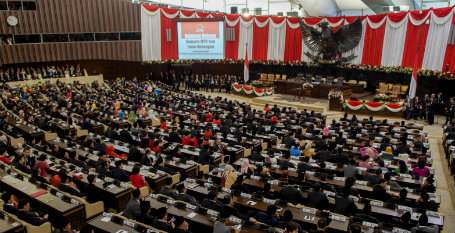LGBT activists have expressed concern over a draft revision to Indonesia’s penal code that effectively bars all extramarital sex, fearing it could target their community.
Channel News Asia reported the move has yet to be finalised, but the potential statute allegedly outlines penalties for cohabitation, same-sex relationships and consensual sex outside of marriage.
Courts recently voted down a similar measure put forward by a conservative lobby called the Family Love Alliance.
Critics say changes to the colonial-era penal code would be difficult to monitor without invading people’s privacy. Andreas Harsono, a representative of Human Rights Watch, described the shift as “creat[ing] new discriminatory offences.”
“If law enforcement agencies are busy policing morality,” he said, “it will slow down Indonesia’s efforts to develop their economy, society, knowledge, education.”
The South China Morning Post reported on Jan. 25 that Indonesian LGBT activists are particularly worried about persecution following a recent survey that revealed nearly 90 percent of their countrymen felt “threatened” by them.












 Printable Version
Printable Version



















Reader's Comments
HRW are wrong to make a noise when they are not elected nor based in indonesia.
The representative of HRW, Andreas Harsono, is Indonesian and based in Indonesia. He is a well-known Indonesian activist on press freedom (cofounder of AJI, the Alliance of independent journalists in 1994, etc).
Indonesia assumed the chair of ASEAN and in May was elected to the UN Human Rights Council for a third consecutive term."
Like I said, hrw are not elected nor based in indonesia.
"Broad and vaguely worded laws were used to arbitrarily restrict the rights to freedom of expression, of peaceful assembly and of association. Despite the authorities’ commitments to resolve past cases of human rights violations, millions of victims and their families were still denied truth, justice and reparation. There were reports of human rights violations by security forces, including unlawful killings and the use of excessive or unnecessary force. At least 38 prisoners of conscience remained in detention. Four people were executed."
* As of 1 January 2018, 107 UN Member States will have served as Human Rights Council Members: Afghanistan, Albania, Algeria, Angola, Argentina, Australia, Austria, Azerbaijan, Bahrain, Bangladesh, Belgium, Benin, Bolivia (Plurinational State of), Bosnia and Herzegovina, Botswana, Brazil, Burkina Faso, Burundi, Cameroon, Canada, Chile, China, Congo, Costa Rica, Côte d’Ivoire, Croatia, Cuba, Czechia, Democratic Republic of the Congo, Djibouti, Ecuador, Egypt, El Salvador, Estonia, Ethiopia, Finland, France, Gabon, Georgia, Germany, Ghana, Guatemala, Hungary, India, Indonesia, Iraq, Ireland, Italy, Japan, Jordan, Kazakhstan, Kenya, Kuwait, Kyrgyzstan, Latvia, Libya, Madagascar, Malaysia, Maldives, Mali, Mauritania, Mauritius, Mexico, Mongolia, Montenegro, Morocco, Namibia, Nepal, Netherlands, Nicaragua, Nigeria, Norway, Pakistan, Panama, Paraguay, Peru, Philippines, Poland, Portugal, Qatar, Republic of Korea, Republic of Moldova, Romania, Russian Federation, Rwanda, Saudi Arabia, Senegal, Sierra Leone, Slovakia, Slovenia, South Africa, Spain, Sri Lanka, Switzerland, Thailand, The former Yugoslav Republic of Macedonia, Togo, Tunisia, Uganda, Ukraine, United Arab Emirates, United Kingdom of Great Britain and Northern Ireland, United States of America, Uruguay, Venezuela (Bolivarian Republic of), Viet Nam, Zambia.
(The list by expiring year is here:
http://www.ohchr.org/EN/HRBodies/HRC/Pages/MembersByYear.aspx)
Please log in to use this feature.